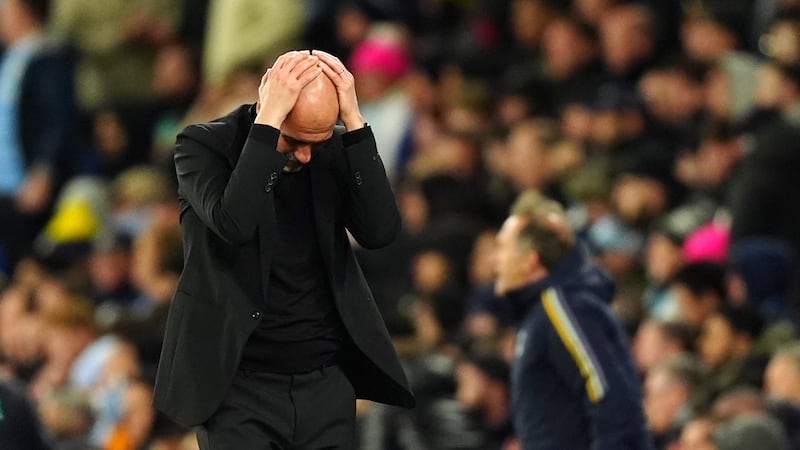I’LL be honest, I never took punctuality too seriously. If I got there five minutes late, it was no big deal.
Whether that was for training, playing a game, meeting someone, work.
What’s five minutes? Or six? Or seven?
I never really appreciated team-mates who arrived on time before training or games. I didn’t think they were better team-mates than me for being punctual. In hindsight, they actually were.
Readers of this column will probably know I’m involved in coaching U7s and U8s Girls’ teams. I was like any other parent.
I brought my child to football training to see if she liked kicking a ball around as much as her old man did.
She loved it immediately. Thereafter, I watched her train every week before some eagle-eyed coaches at the club saw me as easy prey.
So I got involved in coaching the Girls section.
Before I knew it I was wearing a club tracksuit, putting too many cones down, packing my car boot with a trillion kit-bags, breathing uneasily and pretending to know what I was doing every second of every session.
Even then I didn’t have a full appreciation of the importance of being on time.
In the early days I was always on time. Just.
Until one day it happened. A wardrobe malfunction one morning left me scrambling down the road. I was late by seven or eight minutes.
I remember feeling every parent's eye drilling into the back of my head for being late. Nobody wanted to hear about the head coach's wardrobe malfunction. He was just, well, late.
Being late that Saturday morning was a humiliating experience. I've never been late since.
I've a new-found respect for time and how long it takes to get from A to B. I no longer try to wing it by seconds.
The whole escapade reminded me of Tom Hanks’s acceptance speech upon receiving the Cecil B DeMille lifetime achievement award at the Golden Globes in January 2020.
I fully expected the Hollywood actor to wax lyrical about the craft of acting and how he would go all ‘method’ for different roles.
He would break down his talent piece by piece and offer invaluable insight into how to be a great actor.
But Hanks took an entirely different approach. He talked about the importance of being on time for work and recalled his first professional job and how the acting crew turned up late.
They'd engaged in a bit too much partying the night before.
The director growled at them: ‘You know what your job is? You have got to show up on time, and you have to know your text, and you have to have a head full of ideas. Otherwise I can’t do my job.’
The admonishment stayed with Hanks.
“Showing up on time,” he told the audience, “is one of the greatest liberating acts you can give yourself in a movie.
“That means those people with radios in their ears don't need to knock on your door and say they're ready for you. You're actually already ready.
“And you have the liberty, and you have the freedom of being there early enough to settle down - because when the time comes, you have to hit the marks, and you have to ‘go there’.”
Last week, I tuned into a zoom call organised by Antrim’s fundraising body – Saffron Business Forum.
Former Galway midfielder and inter-county manager Kevin Walsh discussed the importance of punctuality in a team environment.
He broke players into three categories.
Player A is the one who turns up early, gives everything during the training session and stays behind to work on his game.
Player A is usually a leader.
Player B, Walsh explained, turns up on time, performs well in training and leaves on time and often goes with the flow and following others.
From a manager’s point of view Walsh’s challenge while managing Galway and Sligo was to turn as many B-type players into A-types.
Player C, Walsh said, were a different, more contrary breed. He called them “caustic players” – guys who would rock up to training late and would struggle to buy into the dominant culture of the team.
They would generally be players who were unhappy with team selection and tactics etc.,
Walsh said it would be difficult for a C-type player to make the jump to B, never mind evolve into an ‘A’ player.
Walsh’s motto on punctuality is one that lingered.
He said: “If you were on time, you were late.”
Being on time, in his eyes, was just doing enough. They were in B-type territory.
As inter-county managers up and down the country enjoy being on the training pitch again, a lot of them will already be sifting through their options and trying to work out their A, B and C-type players as their respective National League campaigns begin next month.
Who arrived in the car-park first and was out on the field with a bag of balls before the session started?
Who arrived at 7pm on the button and left at exactly nine bells?
Who was the player who rocked up five minutes late and blamed the traffic for the second consecutive training session and raced out of the car-park at 9pm?
Punctuality doesn’t make you a good footballer or a good hurler or a good soccer player – but it is a hugely important aspect of being the best you can be.
Being early also takes so much unnecessary stress out of our daily lives. It makes us think a little clearer too.
Tom Hanks hit the nail on the head in his speech. Being on time - or early - is a hugely liberating feeling.







